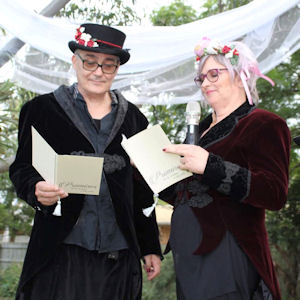Vows, Personal Promises, and what goes first
Categories: | Vows | Wedding Ceremony |
 Recently, there has been some lively
debate amongst Australian celebrants about whether
personal promises (often referred to as personal
vows or just vows) must follow the legal
vows.
Recently, there has been some lively
debate amongst Australian celebrants about whether
personal promises (often referred to as personal
vows or just vows) must follow the legal
vows. Often what shaped the opinion of those celebrants who are adamant that personal promises absolutely must follow the legal vows. was the opinion of the person who conducted their training, passed on to students as fact, and/or other factors such as the advice provided by the Guidelines issued by the Attorney General's Department. I'm of a different opinion for several very logical reasons. Here's why.
What the Marriage Act says
All the Act says about vows is that the couple must, in the presence of their celebrant and two adult witnesses, say to one another
I call upon the persons
here present to witness that I, [Name], take
you, [Name],
to be my lawful wedded wife/husband
to be my lawful wedded wife/husband
("... or words to that effect" which means you can say spouse or partner-in-marriage, and you can also say I ask everyone here)
The Guidelines are advice
Personal promises can take
many forms
Just as long as any personal promise or statement you make does not impose conditions on your agreement to marry, you're good to go.
Consent
So it seems a bit back to front to me to insist that a couple must make their legal vows first. The legal vows create the legal marriage. They are a statement in the here and now and include no promises at all. So insisting that a couple must be legally married before they make the personal promises about how they will treat one another in the marriage feels uncomfortable..
It can be somewhat
one-sided - for a brief moment
Where you have negotiated your personal promises (something I encourage) and so you have agreed on what might be called the performance targets for your marriage, no problem. Where the vows are kept secret until the day, different story.
Legal vows must be said
AFTER the Monitum
There is no such requirement for personal promises.
Personal promises,
personal choice
Thanks for reading!

it is pullin0 Things